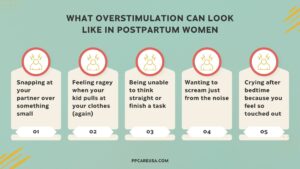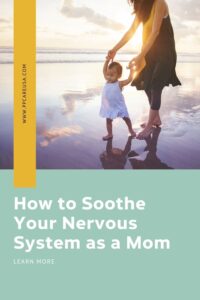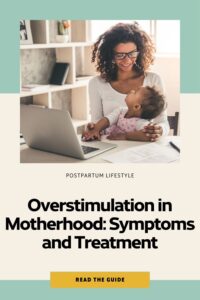Why am I so overstimulated?
It starts as something small: the hum of the dishwasher, the baby whining, your toddler asking the same question on repeat, your phone buzzing with notifications you don’t have time to read.
Then comes the crash. Mom rage, tears behind the bathroom door, guilt in your chest like a brick.
If this sounds familiar, you’re not alone.
Motherhood is beautiful and sacred, but it’s also loud, constant, and full of invisible labor. That mental fog you feel? That tightness in your chest? That need to run away and just breathe?
Those are signs of overstimulation. And yes, there are things you can do to help avoid getting to this point.
In this blog post we will talk about the symptoms of overstimulation and what it feels like when your nervous system just needs a break. We’ll also share practical tips you can implement in just a few moments each day that can make a huge difference in the way you show up for your family, even when you’re overwhelmed by the noise and constantly being needed by your little ones.
So, What Does It Feel Like to Be an Overstimulated Mom?
If you’ve ever found yourself holding your breath during toddler tantrums, gritting your teeth through constant background noise, or crying in the bathroom after a long day—you’re not alone. Studies show that nearly 70% of moms report feeling overwhelmed and overstimulated in their daily life, especially in the early years of parenting (Source).
During the COVID-19 pandemic, even more of the mental load and daily stress fell on mothers as they quickly had to adjust childcare plans and learn how to entertain their children by staying inside and isolated from their support network.
Household chores, childcare, work-life balance, and financial stress can all contribute to feelings of overwhelm in motherhood, and can eventually lead to exhaustion and burnout.
Overstimulation in motherhood often comes from being “on” all the time. You’re constantly tuning into your children’s emotions, responding to needs, making decisions, and juggling invisible responsibilities, often while under-slept and under-supported.
And the result? Your nervous system starts waving a big red flag.
Overstimulation can look like:
- Snapping at your partner over something small
- Feeling ragey when your kid pulls at your clothes (again)
- Being unable to think straight or finish a task
- Wanting to scream just from the noise
- Crying after bedtime because you feel so touched out

You might be meeting everyone else’s needs all day but struggling to meet your own. And you’re not imagining it: when you constantly give without moments to pause, your nervous system gets stuck in overdrive.
Our bodies truly cannot tell the difference between chasing a lion and trying to get dinner on the table before our kids have a meltdown. This stress triggers the same biological response in our bodies—a surge of cortisol and adrenaline, a racing heart, shallow breathing, and a flood of energy meant to help us “survive” the moment.
But when these moments happen on repeat (without rest or regulation), our nervous system stays stuck in high alert, leading to burnout, anxiety, and that constant feeling of being on edge.
Why Do Moms Get Overstimulated?
Let’s be real: motherhood in today’s world is a recipe for sensory overload. There’s the physical touch, the sounds, the mental load, the multitasking. Add sleep deprivation and hormonal shifts and it’s no wonder so many postpartum moms feel like they’re unraveling by 5 PM.
Moms are often the default parent, absorbing the emotional weight of the whole household. We’re always “on,” even when we’re off. That hypervigilance, especially in early postpartum, isn’t a character flaw. It’s a survival mechanism that gets stuck in the “on” position.
The Nervous System in Motherhood: What’s Happening Biologically
Your nervous system has two main gears:
- Sympathetic mode (fight or flight): Alert, reactive, stressed.
- Parasympathetic mode (rest and digest): Calm, connected, regulated.
In a healthy system, you move between the two. But in motherhood, especially in postpartum, the sympathetic system tends to stay stuck in the “on” position, leading to anxiety, sleep issues, irritability, and physical tension.
High cortisol (your stress hormone) is part of this, and it’s common for postpartum cortisol levels to stay elevated, especially if you’re nutrient-depleted or under-supported.
Postpartum Depletion = More Overstimulation
Many moms feel constantly wired but tired. And if you’re also low in nutrients (hello, iron, magnesium, and B vitamins), your body doesn’t have the resources it needs to recover.
This is why nutrition, sleep, and nervous system regulation aren’t just “nice to have” postpartum. They’re essential. They help you get out of survival mode and back into your body.
Overstimulated Mom “Treatment”: How to Cope and Prevent Sensory Overload
There’s no one-size-fits-all fix, but there are small things that help.
Nervous system regulation tools every mama can try:
- Deep breathing (inhale 4, hold 4, exhale 8)
- Cold water on your wrists or splash your face
- Stretching or shaking out your arms
- Weighted blankets or grounding your feet to the floor
- Naming it out loud: “I feel overstimulated right now.”
Lifestyle strategies:
- Eat balanced meals with protein, fat, and carbs to regulate blood sugar
- Cut out unnecessary noise (background TV, loud toys)
- Create transitions between activities to let your brain reset
- Wear clothes that feel physically comfortable
- Plan 10-minute breaks into your day—yes, even with kids
Spiritual Recalibration: How Faith Can Calm the Chaos
If you follow Christ, then you know: even Jesus needed rest.
He slipped away from the crowds. He prayed. He refilled so He could pour out.
So, Mama, it’s not selfish to ask for help or to step away when you’re overwhelmed. Your spiritual health matters just as much as your physical body.
When you feel overstimulated:
- Whisper a breath prayer: “Lord, give me peace.”
- Step outside and recite a favorite verse
- Put worship music on while you fold laundry
- Ask a friend to pray for you
- Journal your fears and invite God into them
Being in community matters too. Church, Bible study, or a local moms group can give you the connection and encouragement your heart needs.
You’re Not Selfish: Reframing Self-Care
Let’s stop thinking of self-care as bubble baths and spa days. Real self-care is:
- Eating a meal before you crash
- Turning your phone off when you’re touched out
- Saying “no” without guilt
- Praying when you feel like shouting
Taking care of yourself is not indulgent. It’s necessary. Because your kids don’t need a perfect mom. They need a present one. And that starts with you honoring your own body, mind, and soul.
Before You Reach Your Breaking Point, Know This:
Overstimulation is a normal, biological response to an over-full plate and a noisy world. It doesn’t mean you’re doing something wrong. It means you need rest. You need support. You need space.
Let this be your permission slip to turn the volume down and reconnect with what really matters. Start with small steps. Pray. Breathe. Nourish your body. Ask for help.
And remember: you are seen, held, and loved.
Come to me, all you who are weary and burdened, and I will give you rest.
—Matthew 11:28
Pin This for Later:



Postnatal Depletion
Meet the Team
Our Services
Supplements
A virtual healthcare clinic that helps postpartum mamas recover from postnatal depletion syndrome with a holistic approach.

Get in touch